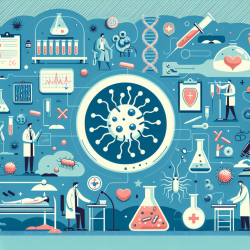Introduction
In the face of rising antimicrobial resistance, healthcare professionals are increasingly exploring alternative treatment methods. One such promising avenue is phage therapy, which utilizes bacteriophages—viruses that specifically target bacteria—to treat infections. The recent research article, "Considerations for the Use of Phage Therapy in Clinical Practice," provides a comprehensive overview of the potential applications and challenges of integrating phage therapy into clinical settings.
Understanding Phage Therapy
Phage therapy is gaining attention as a viable option for treating infections that do not respond to conventional antibiotics. The therapy involves using bacteriophages to target and destroy specific bacterial pathogens, offering a targeted approach that minimizes damage to the body's beneficial microbiota.
The research highlights the increasing use of phage therapy in cases of multidrug-resistant (MDR) infections and biofilm-mediated infections, which are notoriously difficult to treat with standard antibiotics. The Antibacterial Resistance Leadership Group (ARLG) has identified key clinical situations where phage therapy might be beneficial, including respiratory tract infections, urinary tract infections (UTIs), and infections involving indwelling medical devices.
Clinical Applications and Considerations
The study outlines several clinical scenarios where phage therapy has shown promise:
- Recurrent UTIs: Phage therapy has been used to successfully treat UTIs caused by MDR bacteria, with reports of microbiological clearance in urine and stool.
- Chronic Rhinosinusitis: Intranasal phage therapy has been well-tolerated in pilot studies, showing potential for eradicating chronic infections.
- Respiratory Infections: In cystic fibrosis patients, phage therapy has been used to treat respiratory infections caused by MDR bacteria, leading to clinical improvements.
Despite these successes, the research emphasizes the need for more controlled clinical trials to establish standardized dosing regimens and to better understand the interactions between phages, antibiotics, and the human immune system.
Challenges and Future Directions
While phage therapy holds great promise, several challenges remain. The lack of standardized methods for phage susceptibility testing (PST) and the need for regulatory frameworks to support the clinical use of phages are significant hurdles. The research calls for a systematic approach to data collection from compassionate use cases to inform future clinical trials.
Moreover, the potential for phage resistance and the need for phages to be used in conjunction with antibiotics are critical considerations. The study suggests that phage therapy should be considered a complementary treatment rather than a standalone solution, with ongoing research needed to optimize phage-antibiotic combinations.
Conclusion
Phage therapy represents a promising frontier in the fight against antimicrobial resistance. By leveraging the natural ability of bacteriophages to target specific bacterial pathogens, healthcare professionals can potentially improve outcomes for patients with refractory infections. However, further research is essential to address the current gaps in knowledge and to develop standardized protocols for the safe and effective use of phages in clinical practice.
To read the original research paper, please follow this link: Considerations for the Use of Phage Therapy in Clinical Practice.










